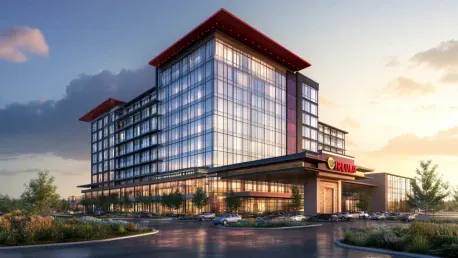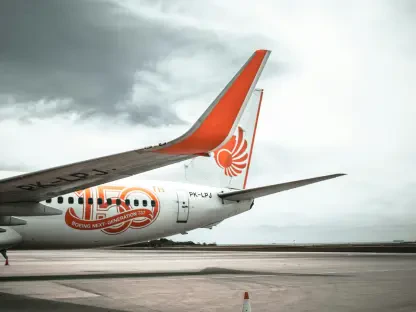Katarina Railko is our Hospitality expert. She refined her skills in the travel and tourism industry. She is also a key voice in entertainment and events, with an affinity for expos and conferences. Today, she joins us to discuss IHG Hotels & Resorts’ acquisition of the Ruby brand and its implications for the hospitality industry.
Can you tell us what motivated IHG to acquire the Ruby brand?
IHG was motivated to acquire the Ruby brand to expand its portfolio with an exciting and distinct offer for both guests and hotel owners in key city destinations. Ruby’s premium urban lifestyle concept fits well within IHG’s strategy of entering high-barrier market segments. The brand’s established success in Europe and its potential for global expansion were significant factors in IHG’s decision.
How does the Ruby brand fit into IHG’s existing portfolio?
Ruby extends IHG’s appeal to modern, lifestyle-focused travelers. It offers a cost-efficient and adaptable premium hotel concept, particularly suited to urban markets with space constraints. This complements IHG’s existing brands by filling a niche in the ‘Lean Luxury’ category, providing stylish yet affordable accommodations in prime city locations.
Could you share more about the initial purchase consideration of €110.5m for Ruby?
The initial purchase consideration of €110.5m for Ruby includes an upfront payment of €109.9m and a deferred payment of €0.6m. This structured payment reflects the brand’s immediate value and the strategic benefits IHG expects to gain from its integration and expansion in the global market.
How is Ruby’s “Lean Luxury” approach different from traditional hotel models?
Ruby’s “Lean Luxury” approach focuses on providing high-quality essentials at an affordable price. This model includes comfortable beds, efficient showers, and aesthetic designs for relaxation, combined with 24/7 bars offering unique cocktails. This approach contrasts with traditional models by emphasizing stylish, urban experiences without unnecessary luxury frills.
How does Ruby’s concept of urban micro hotels benefit both guests and owners?
Ruby’s urban micro hotels benefit guests by offering a high-quality, affordable stay in central, sought-after locations. For owners, the concept is beneficial due to efficient use of space and high degrees of operational standardization, which reduce costs and improve profitability. Additionally, the flexible design supports adaptive reuse, making it easier to convert existing properties.
Can you explain what specific efficiencies and operational strategies Ruby uses to maintain cost-effectiveness?
Ruby employs several strategies, including space-saving designs and operational standardization. Their use of self-service kiosks for check-in and other automation tools reduces labor costs. The lean, efficient hotel design allows for more rooms within the same space, optimizing revenue potential.
What makes Ruby’s space-saving designs and high degree of operational standardization special?
Ruby’s designs maximize the use of limited urban spaces without compromising on style or comfort. This efficiency extends to all aspects of hotel operations, from room layouts to automated systems, ensuring a consistent, high-quality experience. These features help maintain lower operating costs while still delivering a premium guest experience.
How has Ruby’s net system size compound annual growth rate (CAGR) performed over the last five years?
Ruby has achieved a net system size CAGR of 26% over the last five years. This impressive growth rate highlights the brand’s strong market acceptance and the effectiveness of its business model in attracting both guests and hotel owners.
What future growth plans does IHG have for the Ruby brand in terms of its global expansion?
IHG plans to grow the Ruby brand to more than 120 hotels over the next 10 years and aims to accelerate this to over 250 hotels within 20 years. This expansion strategy will leverage Ruby’s proven success in Europe and extend it to the Americas and Asia, thereby increasing IHG’s market presence globally.
How does IHG plan to leverage its enterprise platform and technology systems to benefit Ruby hotels?
IHG will integrate Ruby hotels into its powerful enterprise platform, which includes advanced distribution and technology systems. This integration will enhance operational efficiencies, improve guest experience through better booking and loyalty programs, and provide hotel owners with sophisticated data analytics and support tools.
What are the anticipated franchise fees for IHG from the current open and pipeline Ruby hotels by 2028?
The anticipated franchise fees from the existing 20 open Ruby hotels and the 10 pipeline hotels are expected to be approximately $8m by 2028, once all the hotels are integrated into IHG’s system. This reflects the brand’s strong earning potential within IHG’s portfolio.
Can you explain the financial overview, including possible additional payments to the seller in 2030 and 2035?
The initial €110.5m purchase can be followed by additional payments ranging up to €181m by 2030 and 2035. These future payments depend on the number of Ruby-branded rooms operated by the seller, incentivizing them to expand the brand. Scale targets for these payments range from 10,000 to 20,000 rooms, significantly larger than the current operation.
How will the integration process of the current 20 open Ruby hotels into IHG’s system unfold over the next few years?
The integration of the currently open Ruby hotels into IHG’s system will start later in 2025 and is expected to be completed by March 2026. This process includes aligning the hotels with IHG’s standards and systems, thereby increasing IHG’s global system size by approximately 0.3%.
What are the expected integration operating costs for IHG in 2025 and how will they impact profitability?
The expected integration operating costs for IHG in 2025 are around $10m. Including additional one-time costs, the contribution to IHG’s operating profit is anticipated to be broadly breakeven in 2026. Profitability is expected to grow steadily thereafter as the integration benefits take effect.
What plans does IHG have to develop the Ruby brand in the United States by the end of the year?
IHG plans to have the Ruby brand ready for development in the US by the end of the year. This will involve identifying suitable locations, adapting the brand’s concept to the local market, and leveraging IHG’s extensive network and market knowledge to establish a strong foothold.
Can you discuss the potential for adaptive reuse of office spaces into Ruby hotels?
Ruby’s model is particularly well-suited for adaptive reuse, especially in converting office spaces into hotels. This approach is efficient and cost-effective, allowing for rapid expansion. The demand for such conversions is high, positioning Ruby for significant growth in urban markets where space is limited.
Michael Struck mentioned the timing for the Ruby brand’s expansion is ideal. Can you elaborate on the factors contributing to this?
The timing is ideal due to the high demand for innovative, efficient hospitality solutions post-pandemic. Travelers are seeking more personalized and experiential stays, and Ruby’s urban micro hotel concept meets this demand. Furthermore, the increasing availability of commercial properties for conversion presents an excellent opportunity for growth.
How does IHG’s acquisition of Ruby reflect its strategy towards entering high-barrier market segments?
The acquisition of Ruby aligns with IHG’s strategy to penetrate high-barrier markets that are typically challenging to enter. Ruby’s efficient space utilization and scalable design allow IHG to establish a presence in prime urban locations where real estate costs and space constraints are significant barriers.
What measures will IHG take to preserve Ruby’s unique identity and culture while integrating it into its system?
IHG will respect and maintain Ruby’s unique identity and culture by integrating the brand without altering its core values and operational model. IHG’s experience with previous acquisitions will ensure that Ruby retains its distinctive character while benefiting from enhanced resources and support.
What are some of the unique challenges and opportunities you foresee in taking Ruby to the Americas and Asia?
Expanding Ruby to the Americas and Asia presents unique challenges such as adapting to different market preferences and regulatory environments. However, the opportunities are vast, with high demand for urban lifestyle hotels in these regions. IHG’s extensive local market knowledge and global network will be instrumental in overcoming these challenges and driving successful expansion.
Do you have any advice for our readers?
My advice for readers, especially those in the hospitality industry, is to closely follow market trends and be adaptable. The success of brands like Ruby showcases the importance of innovation and efficiency in meeting modern travelers’ needs. Embrace new concepts and continuously seek ways to improve the guest experience through unique and value-driven offerings.









